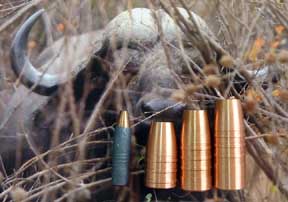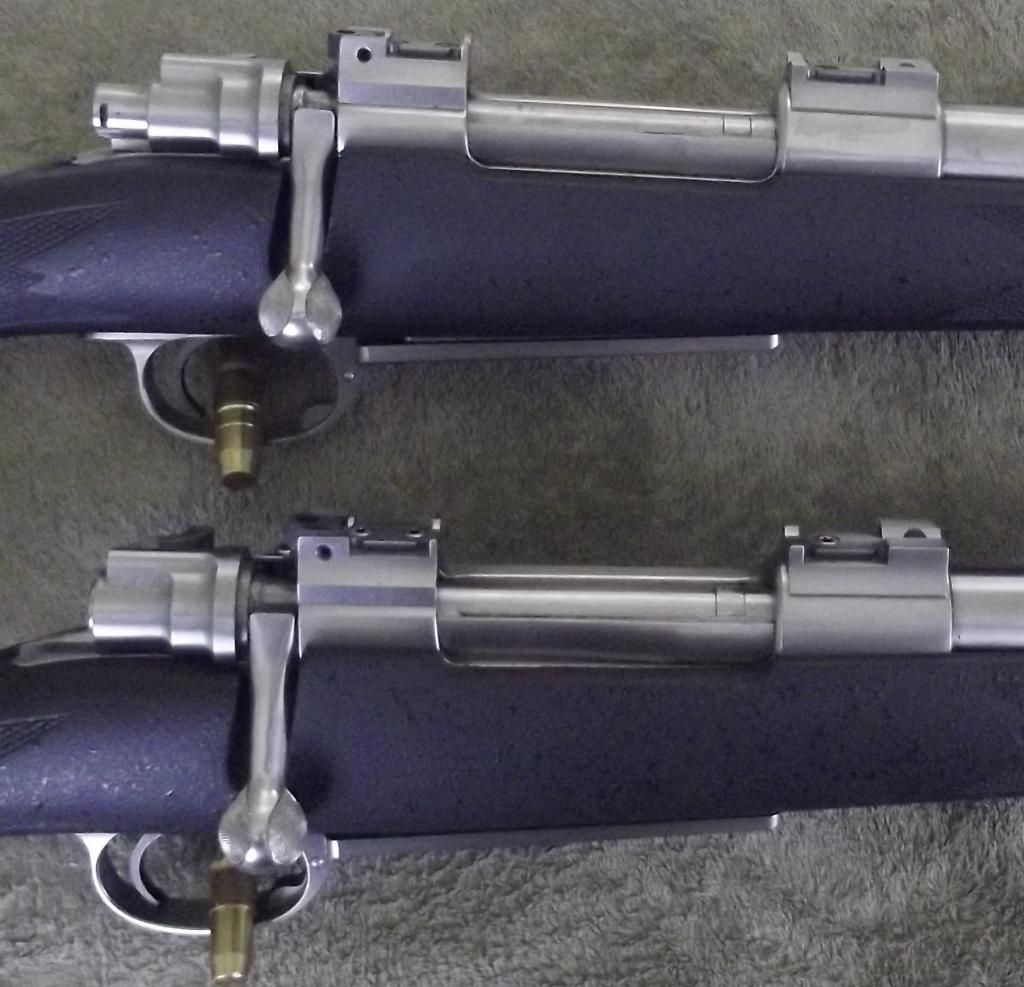

 The Accurate Reloading Forums
The Accurate Reloading Forums  THE ACCURATE RELOADING.COM FORUMS
THE ACCURATE RELOADING.COM FORUMS  Rifles
Rifles  Big Bores
Big Bores  Bullets, premium, non-con, not-non-con, and name them
Bullets, premium, non-con, not-non-con, and name themGo  | New  | Find  | Notify  | Tools  | Reply  |  |
| One of Us |
Since the start of last century, jacketed bullets have come a long way. The developments and refinements of the last decade or so have given birth to a new breed of bullets that are still looking for a name. Although lines are blurred between the various incremental improvements, or leaps in design, I think that we can distinguish between the early cup-and-core designs (un-named), the generation of the various partitions, bonded cores, and early mono-metals (loosely referred to as "Premium), and the new generation of bore-riding mono-metals, wide meplat solids, cup-points - such as North Fork, GS, CEB, Woodleigh Hydro etc. The term Non-conventional has appeared for the latter, but naming something "Non-whatever" is, well, non-naming... Why not refer to "Generation I, II, and III"? Thus a plain-vanilla unbonded cup-and core would be Gen I, a Swift A-Frame or Brenneke TIG would be Gen II, and a CEB or GS Customs would be Gen III. There would be room for endless arguments about the proper classification of a number of designs and design features, which would generate innumerable hours of entertainment for generations of internet-addicted ballistico-enthusiasts, to the great advantage of this community... | ||
|
| One of Us |
I would stutter if I had to say that sentence three times fast--- "The rule is perfect: in all matters of opinion our adversaries are insane." Mark Twain TANSTAAFL www.savannagems.com A unique way to own a piece of Africa. DSC Life NRA Life | |||
|
| One of Us |
That's because I wrote it slowly... | |||
|
One of Us |
A six paragraph response has been reduced to a much more succinct, "Yep..." Jim "Life's hard; it's harder if you're stupid" John Wayne | |||
|
| one of us |
Naming bullets by the Gen handle would be too simplistic. Classing bullets according Gen status would imply that the latest Generation is somehow better than a previous one. For example, how would one accommodate an earlier design, classified as a GenII, but that has a mechanism different to a later bullet that is classed as a GenIV. GenII may be better than GenIII for a particular purpose. GenII may have a different purpose to GenV and better suited to that purpose. Tabulation is dangerous as it makes concrete some preconceived ideas that may miss the point and, what is obvious, but wrong, may become the accepted norm. There are many examples of this. | |||
|
| One of Us |
My own unscientific testing has shown that round nosed FMJ bullets yaw and tumble when shot lengthwise into 6" x 12" Douglas Fir wooden blocks. Flat-nosed ones like some old Barnes solids or Speer AGS tungsten cored pills travel as straight as a ruler. I couldn't imagine anyone shooting an animal where penetration is desired with a round nosed solid. The Hornady 500 gr. FMJ's that go for about a dollar a piece are strictly intended as practice ammo, I would think. | |||
|
| Administrator |
As far as I am concerned, there are 4 types of bullets. 1- Jacketted soft points, like any of the normal SP you can buy from any manufacturer. 2- Partition bullets like Nosler and Swift A-Frame. The ones that have lead in the front half and rear half, seperated by a copper partition. 3- Solid shank bullets that have lead in tags front half, shrike the rear half is solid copper. Like the Trophy Bonded Bear Claws and Jensen bullets. 4- Then you have the various bullets made completely of copper, with various HP designs. For me, number 4 above is far superior to anything else. That is why they god only ones we use for hunting now. I have used all the above types for hunting all sorts of game. I have experienced some failures with the normal SP and partition bullets. But never with number 3 and 4 above. | |||
|
One of Us |
Small addition to #4, otherwise the listing covers bullet 'construction types' very well. Jim "Life's hard; it's harder if you're stupid" John Wayne | |||
|
| One of Us |
It appears that there is now a fifth type: 5. all brass hollow point in which the front pieces break off on impact and radiate away from the line of trajectory at a significantly sharper angle than copper pieces and in which the remaining core is almost a full-cylinder, blunt nose solid that creates an impressive wound channel on its own. See the terminals thread, last couple of hundred pages. What remains is to get the BC and stability of these type-5 bullets optimized. At the moment, the .375" 235grain ER raptor has a BC of .337 and is stable in normal twist barrels (12"). However, the .416", .458", and .510" bullets do not have high BC bullets that are stable in 16" barrels. It is probably possible to design something around .400 BC and stable by leaving the 13 degree "solid" formula and maybe by redesigning the nose instead of relying on a plastic tip. +-+-+-+-+-+-+ "A well-rounded hunting battery might include: 500 AccRel Nyati, 416 Rigby or 416 Ruger, 375Ruger or 338WM, 308 or 270, 243, 223" -- Conserving creation, hunting the harvest. | |||
|
| one of us |
While we are at it, we might as well add a sixth type then: 6. All copper hollow point in which the petals break off, after forming of the wound channel, when there is excess speed (energy and momentum) and in which the remaining core is almost a full-cylinder, blunt nose solid that creates an impressive wound channel on its own. When speed is under a pre-determined level, (low speed cartridges or extreme distance) the bullet expands and retains full weight. The bullet expands from as low as 1600fps impacts and sheds petals after forming the wound channel at 2500fps to 2700fps impacts. 416Tanzan, Look at this. | |||
|
One of Us |
I believe the copper and brass monometals should just be grouped in category 4 because there will be different performance variations within each group of bullets and these variations will be driven by the design performance envelope of each bullet. Jim "Life's hard; it's harder if you're stupid" John Wayne | |||
|
One of Us |
Tanz I responded to your post in the TBP thread. Perhaps this can be discussed in one thread only? Jim "Life's hard; it's harder if you're stupid" John Wayne | |||
|
| one of us |
capoward, That would be like making 1, 2 and 3 one category. Can't be done. In the minds of some reloaders, the differences between monometal bullets are not distinct yet. Some reloaders even think that copper and brass bullets are the same. | |||
|
One of Us |
Gerard, I agree that many, if not most, individuals look at monometal bullets collectively as "some expensive 'black art' things" without understanding the performance nuances that can be built into CNC machined monometal bullets. I just figured it's be easier for that group of individuals to throw them collectively into one category. The other group of individuals who really want to get into the monometal bullets will quickly find out it truly a bold new world with many great things to offer the demanding hunter or target shooter. But, number's 1-3 do have a single distinctive characteristic in that they are all a variant of the general Cup and Core construction. Perhaps we really only need two categories with descriptive variants within each category... Jim "Life's hard; it's harder if you're stupid" John Wayne | |||
|
One of Us |
Yep, its a long hot summer... Jim "Life's hard; it's harder if you're stupid" John Wayne | |||
|
| Administrator |
Gerard, You are guaranteed bullet weights are very good. It amounts to a maximum variation of 0.75 of a grain for a 300 grain bullet. Funny enough, I segregate our bullets in boxes of several hundreds, with maximum weight variation of 1 grain or less. The reason I do this that depending on the copper lot we get, a 300 grain bullet might end up being anywhere from 300 to 304 grains. | |||
|
| one of us |
Saeed, We hold that weight tolerance from batch to batch and often run much tighter than that within a run. If you are getting much variance in weight, look at the drill for the hollow point. When we replace a drill and the weight changes radically, the drill diameter is usually the culprit. | |||
|
| one of us |
Why are you complicating the subject..simple English decribes any bullet you speak of such as Corelokt or Corlokt IB, Nosler Partition, North Fork cup point. they describe a bullet better than 1, 11, and 111! Why in the world must we categorize everything! Ray Atkinson Atkinson Hunting Adventures 10 Ward Lane, Filer, Idaho, 83328 208-731-4120 rayatkinsonhunting@gmail.com | |||
|
| One of Us |
Because yuppies like the buzz words, Gen I, Gen II, etc. NRA Endowment Life Member Life Member Wild Sheep Foundation | |||
|
| One of Us |
Yuptards, edutArds and dotards love buzzwords. | |||
|
| Administrator |
Gerard, I know where the variations comes from. It is the relative density of each batch of copper we get. We actually use copper that is meant for earthing in the building trade. This fact by itself does not affect the performance whatsoever. I just like to keep each batch we make close in weight, and decided that within 1 grain is good enough for my purpose. And as in your case, normally it is held to less than that. I was given some copper rods imported from the US. They are different types, but I have not had a chance to try them. | |||
|
| One of Us |
There are only two kinds of bullets, just as there are only two kinds of food, two kinds of music, and two kinds of everything else, including but not limited to people: Good and bad. That's it. Mike Wilderness is my cathedral, and hunting is my prayer. | |||
|
| one of us |
"Earthing in the building trade" means for grounding of lightning rods wired to copper rod sunk in the earth? Maybe a lightning strike lightens the copper rod, which could cause the copper density variation that Saeed is subject to? Maybe Saeed is getting a mix of used and new copper rods? | |||
|
| Administrator |
Ron, The rods we get are 99.99 percent copper. But I suspect because they used for earthing purposes in building, they might not be held to as high a tolerance as others. For our purpose, they work great. | |||
|
| Powered by Social Strata |
| Please Wait. Your request is being processed... |
|
 The Accurate Reloading Forums
The Accurate Reloading Forums  THE ACCURATE RELOADING.COM FORUMS
THE ACCURATE RELOADING.COM FORUMS  Rifles
Rifles  Big Bores
Big Bores  Bullets, premium, non-con, not-non-con, and name them
Bullets, premium, non-con, not-non-con, and name them

Visit our on-line store for AR Memorabilia

